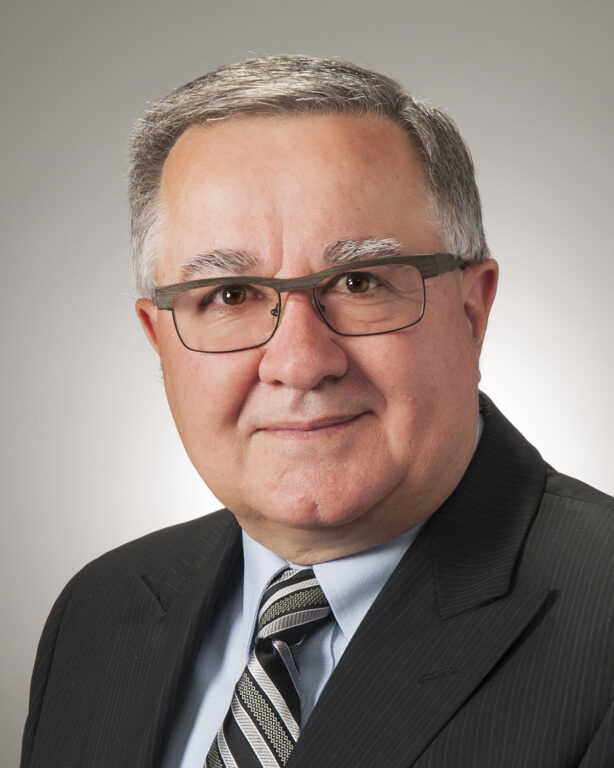
Bob McDonald, P.Eng., MBA, LL.B., is wrapping up his time as Executive Director and Registrar of APEGS before retiring in mid-January.Looking back on his more than 20 years with APEGS, he shares what he recognizes about the regulation of the professions, the association and those who have dedicated themselves to APEGS through their work and volunteer efforts.
Being of Value to APEGS
When McDonald started working as APEGS’ Director of Membership Services in mid-January 1999, he saw what he could contribute. He recognized working for APEGS was an opportunity to apply his education and experience to benefit the public and members.
McDonald graduated with a B.Sc. in Chemical Engineering from the University of Saskatchewan in 1978 and was registered as a professional engineer in 1980. He also has both an MBA and LL.B., and is a member of both APEGS and the Law Society of Saskatchewan. Bob served on the Body of Knowledge Task Team of Engineers Canada to establish the syllabus for the professional practice examination. He was a partner in a Regina law firm prior to joining APEGS.
During his time with APEGS, he moved into other roles, including becoming Director of Membership and Legal Services and Deputy Registrar before being named Executive Director and Registrar. In addition to handling the responsibilities of his roles, he was able to step in to provide assistance as needed.
He provided staff support to APEGS’ committees and boards, including the Education Board, the Image and Identity Board, the Discipline Committee, the Consulting Practice Committee and the Investigation Committee.
Being a lawyer, he was also able to represent APEGS for nine weeks of hearings at the North Battleford Water Inquiry in 2002. He also appreciated the opportunity to do government relations work with Engineers Canada at Parliament Hill.
A Growing Association
During his years with APEGS, McDonald has seen the numbers grow. When he started in 1999, APEGS had about 5,000 registered members and eight staff members. Each year, there were around 200 international applicants. As he prepares to leave APEGS, there are now 15,000 members, 25 members of staff and 1,000 to 1,200 international applicants a year. Much of that growth accelerated starting in 2004, but it has been more modest in recent years.
The Culture of APEGS
Through his experience, McDonald has recognized how the contributions of all who volunteer and work for APEGS have resulted in a culture made up of three qualities.
The first is fairness and relates to APEGS’ role as a regulator of the professions.
“Our obligation to the public is safeguarding and regulating the professions in the public interest,” said McDonald.
He sees it as necessary going forward to be aware of the legal framework around the regulation of the professions, not just in Saskatchewan, but across Canada and not just for engineers and geoscientists, but all self-regulated professions. He advises monitoring trends in the public’s confidence in self-regulated professions so as to establish an appropriate level of transparency in order to withstand public scrutiny.
“Self-regulation is a privilege granted by, essentially, the public of Saskatchewan as represented by the government of Saskatchewan through, in our case, The Engineering and Geoscience Professions Act, said McDonald.
“We don’t want to get into such a situation that we look at self-interest over public-interest.”
He points to the power of social media as an instrument capable of eroding public trust. Those uninformed posting to and sharing on these platforms can put pressure on the political process and influence public policy.
The second quality of the culture is respect, which is demonstrated in interactions between staff members, with the public as well as applicants and members.
The third is service, which is revealed through APEGS’ staff avoiding being strictly officious in their work to regulate the profession to instead providing guidance. He recalls learning from Dennis Paddock, P.Eng., his predecessor who retired in 2016, who he describes as “a wonderful mentor and friend.”
How Service Motivates
The value of service was made clear to him in a letter he received from a member about his impact on their career and those of many other members. He said the letter exemplifies what motivated him in his work with APEGS.
“I have stopped to think about all the engineers that have assisted me with my career and you’re at the top of my list,” this member wrote.
This person felt more capable navigating the work experience process to become a designated P.Eng. and making education and career decisions because of McDonald’s guidance. McDonald provided this guidance not just through his work for APEGS, but also through the law and ethics class he taught engineers at the University of Regina.
He recognizes that quality of service is also seen in the dedication of those volunteering for various committees and initiatives of APEGS.
“APEGS relies very heavily on its volunteer base at any given time,” said McDonald.
“We have a lot of reliance on volunteers and staff whose core responsibility is co-ordinating a lot of activity.”
Timing his Exit
He says the time is right for him to step back and for another person to step up to take over leading APEGS.
“We’ve had some significant change in a governance review project which was followed by a governance change project,” said McDonald.
“I didn’t want to be in a position that I was essentially handcuffing my successor with a bunch of decisions that I made in the last six months that I was here.”
He does not have solid plans for his time in 2022, but has opportunities and interests he will explore between now and then, including writing his thesis for his Master’s in History, teaching some classes in law, ethics and economics to engineering students at the University of Regina and volunteering in the area of corporate registration. Plus, some golf wouldn’t be a bad way to spend some of his summer days.